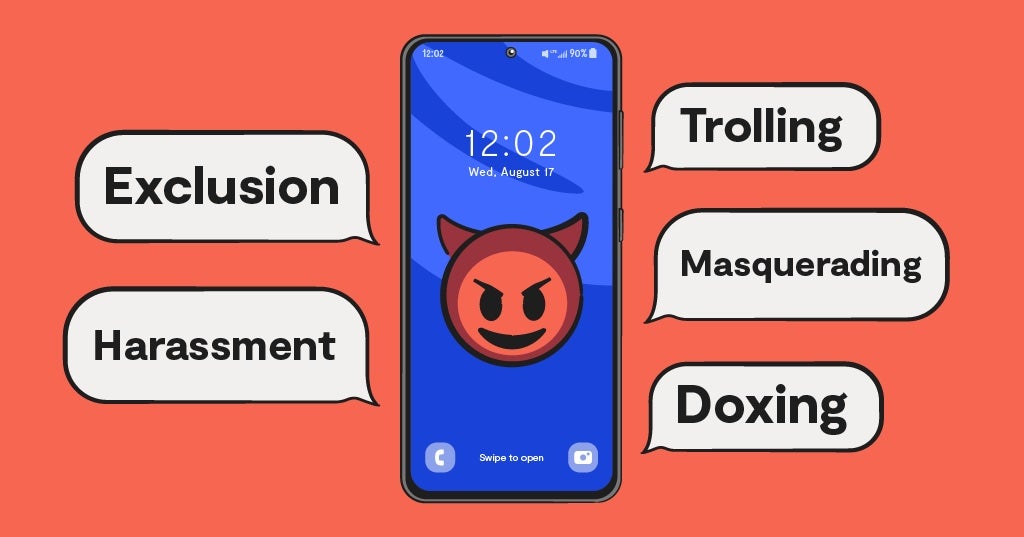
Overview
Online harassment, often also referred to as cyberbullying, can take many different forms. Common methods can include:
- Doxing - this tactic refers to either when publicly available information about an individual is harvested across various online platforms and/or when non-public personal information is released in an attempt to directly harm or humiliate the victim
- Impersonation - online impersonation occurs when your name, image, or likeness is falsified to create a digital presence (e.g., email, social media, etc.) masquerading as the real individual. In many cases, these accounts are created to spread misinformation and/or participate in reputationally damaging behavior acting as the individual
- Trolling - a method to incite or inflame by deliberately commenting or acting in a way to provoke others online
- Cyberbullying - the use of all manners of electronic communications, including the methods above, to harass the subject
Additional forms of online harassment can be viewed in this 10 Forms of Online Harassment article. With the vast amount of information so readily available online, anyone can be a victim of online harassment. It is important to consider ways you can safeguard yourself and your loved ones against the increasing threat of this risk.
How to Protect Yourself
- Review your social media accounts and settings:
- Accept requests only from people you know - set your profile to friends or connections only
- Close any accounts you are no longer using
- Avoid posting sensitive personal details, like your phone number, home address, or location
- Use aliases and/or unique usernames for each social media platform or account
- Use strong and unique passwords, UCLA offers 1Password freely available to all faculty and staff:
- Enable multi-factor authentication for additional security of your online accounts
- Sanitize your online presence:
- UCLA Faculty and Staff members are automatically enrolled in the UC Identity Theft Protection service provided by Experian. Utilize their Data Removal service to sanitize your online presence by following the instructions on the Data Broker Removal Knowledge Article.
- Run a web engine search on yourself or search using a tool to discover where else information may be publicly posted
- Modify or remove any content appearing on sites that you have created or can control
- For improper use of your data, submit requests to the hosting provider to ask that the content be removed (see instructions below)
- Exercise your right to "opt-out" and to "delete" your personal data being collected and sold by data brokers; see basic steps in this article, How to Remove Your Information From People Search Sites.
Response to Online Targeting/Harassment
If you have been a victim of online harassment, consider some of the following actions below to take back control. If the harassment received place into question the physical safety or wellbeing of yourself and/or your loved ones, contact your local law enforcement immediately to file a report. The UCLA Police Department’s (UCPD) non-emergency line can be reached at (310) 825-1491.
Many social media platforms and forums will process takedowns on content that is abusive, harassing, or threatening as it violates their Acceptable Use Policy or Terms of Service. Requests can be made by following instructions to submit a report:
If you are experiencing any form of online targeting/harassment, take steps to preserve evidence.
- Take screenshots of photos, comments, and other digital content that was inappropriate and/or offensive
- Save all text messages, emails, voice messages, etc.
Having to revisit content can exact an emotional toll, raise anxiety, and elicit additional fear; enlist the aid of trusted friends or family to assist if necessary.
Once evidence has been collected, consider blocking the antagonizer(s) on social media, email, and phone.
Doxing is illegal in the state of California and can be considered a criminal offense. If comfortable, consider filing a report with your local authorities and/or report to security@ucla.edu if you need any assistance collecting evidence or removing offensive material.
The UCLA Campus Directory publishes basic information, including UCLA email, for all active faculty, staff, and students. If your UCLA identify is the target of online harassment, consider submitting a request to remove your information.
If you have been a victim of online harassment and need to immediately delist yourself from the UCLA Campus Directory, please email help@it.ucla.edu.
If you are a student, visit MyUCLA to change your privacy settings. If you are a faculty/staff member, contact your department directory updater to request removal. See Update Directory Listing Instructions for more information
The University of California (UC) offers free Identity Theft Protection through Experian to all faculty and staff members. This service includes access to Experian's online data cleansing service, Digital Identity Manager. Enrollment is automatic, but first-time setup is required to take advantage of this service. Please visit UC's website on their Identity Theft Protection service to learn more. For specific instructions on the data cleansing service, please visit the Data Broker Removal knowledge article.
Several other online services also exist that can help scour the Internet and remove your information from data brokers and search sites. UCLA maintains no affiliation with these services, and we encourage individuals to fully research the products before subscribing.
Cyberbullying and harassment can severely impact the victim's sense of safety and lead to emotional distress, anxiety, depression, and fear. This can affect not just the individual targeted but their loved ones as well.
On-campus services are available to speak with victims of online targeting, harassment, and/or hate.


